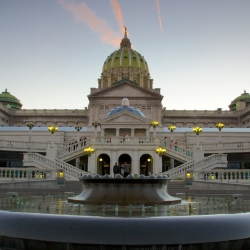Day 80 of the Pennsylvania budget stalement came-and-went and the state is no closer to either online gambling legalization or paying for a $2.2 billion budget deficit. The two issues are linked, because both the House and Senate bills include expanded gambling for Pennsylvania.
Monday was a day of note, because the state will default on about $1 billion in payments if no financing plan was not agreed upon yesterday. Governor Tom Wolf said he would have to choose which programs he would have to defund temporarily, while he speculated Standard & Poor’s might downgrade the state’s credit rating.
House GOP: No New Taxes
House Speaker Mike Turzai’s “No New Taxes” bill was dissected by the Pennsyvlania Senate on Monday, which criticized the Speaker’s proposals as “unrealistic”. That is the exact same word Gov. Wolf used to describe the House Bill 453 last week.
On Monday, the Senate Republicans had a 2-hour closed door meeting to discuss whether to adopt the H453 or seek changes.
The Republican caucus is said to be split on which direction to take, because many want to resolve the deficit in the $32 billion budget soon. Eventually, the GOP senators emerged with a plan — to call for changes in the House bill.
Senators Criticize H453
The senators say the House plan would harm Pennsylvania’s long term financial picture. It would be unduly expensive, said the GOP senators. They say Turzai’s proposals have few “recurring revenues” (apparently their term for taxes), so it would cost the state higher interest payments and would borrow from the landmark 1988 tobacco settlement.
In a general sense, the Senate bill calls for the state to raise taxes. The form of taxation has not been nailed down. One faction of Democrats called for a tax on businesses tapping the Marcus shale oil reservoir. Other lawmakers have called for taxes to be raised from major changes to the alcohol and gambling laws in the state. One proposal called for 10 new satellite casinos owned by already-existing casino and racino license holders. Another proposal called for taxes on 40,000 video lottery terminals, as well as tablet computer gambling in Pennsylvania‘s international airports.
Joe Scarnati: “We’re Out of Money”
The House Republicans originally supported VGT legislation, but seem to have cooled on the option, because it was not considered feasible. The two legislative houses seem to be at an impasse, which is how Senate President Pro Tempore Joe Scarnati (R) sees the dilemma.
On Monday, Joe Scarnati said, “Where we’re at financially is not good. We’re out of money. I don’t know by any means you can put lipstick on that or spin that any way to make it look better or sound better. But we’re out of money and we’ve never been in this position before, being out of money.”
Impasse Leads to Credit Downgrade
In a late-breaking update, Pennsyvlania’s budget impasse led to a credit downgrade by a major financial firm. Stating that it believes the state’s budget standoff could “extend considerably further”, S&P Global Ratings downgraded Pennsylvania’s credit rating. That means the state will find it harder to borrow money in the future, while it will pay higher interest rates when it does.
Carol Spain, a S&P Global Ratings analyst, gave a statement by the credit rating agency on the status of Pennsylvania’s budget crisis. The analyst said, “The commonwealth’s structural deficit remains manageable, but its reliance on one-time revenues has stressed its available cash, making internal resources insufficient to timely meet certain obligations.”
After months of political spin by the various sides in the budget deficit debate, Carol Spain’s analysis might be the first directed information on the state’s predicament from someone who knows a lot about the situation, but is not politically motivated one way or the other. Spain seems to echo the complaints of the Senate Republicans, who have criticized Mike Turzai’s reliance on one-time fixes in his budget proposals.

